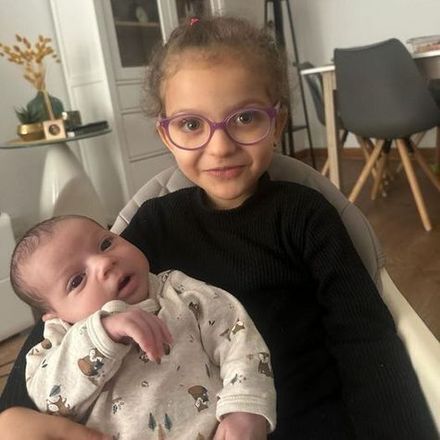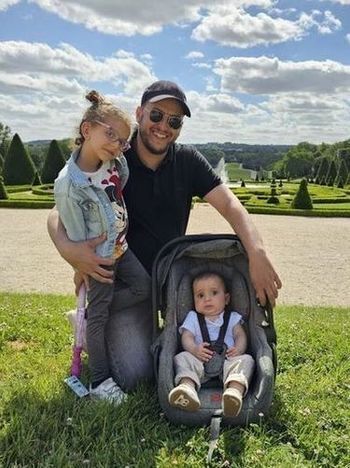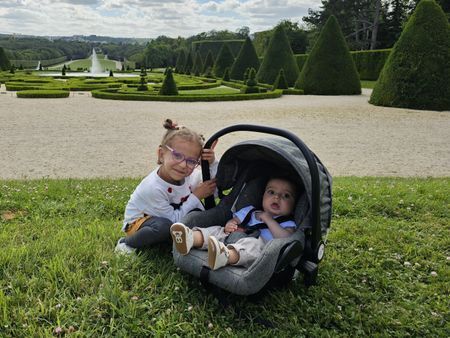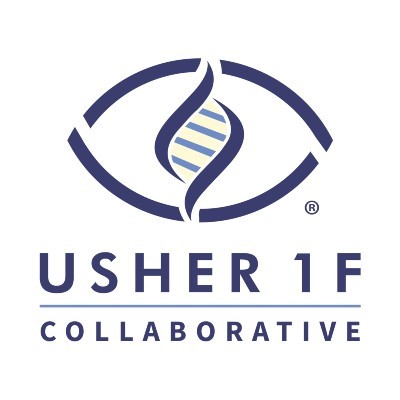
Khaled Labed and his wife Souheir Hammani live in Paris, France, with their three children, two of whom have Usher 1F. Khaled and Souheir share an unusual connection through their grandmothers. Both of Khaled’s grandmothers along with Souheir’s maternal grandmother were sisters. They were of Eastern European Ashkenazi Jewish ancestry. Their family emigrated to Algeria in the 18th century. What they did not know is that Souheir’s grandmother and at least one of Khaled’s grandmothers carried the most prevalent Usher 1F mutation. While their first child was not affected, their two younger children both have Usher 1F.
In 2015, when they had only one child, Khaled and Souheir moved to Morocco for professional opportunities. In December 2018, they returned to Paris for the birth of their second child, Bella, to be close to their families. Although France has universal newborn hearing screening, they were told the test did not work for Bella but they should not worry, that it was likely an issue with the testing equipment. After returning to Morocco, a few months later Souheir noticed that Bella was unresponsive to sound and did not know her name, and their anxiety grew. They remembered the unsuccessful hearing test. Bella also had delayed gross motor milestones and balance issues, suggesting an affected vestibular system.

Khaled with his children Bella an Ismail
They immediately consulted a pediatrician, who referred them to an ENT clinic to perform a hearing test, which confirmed that Bella was profoundly deaf. Khaled felt as if “the world seemed to collapse beneath our feet.” He felt helpless, wondering if his daughter would ever hear him. Wanting to know more, he combed the internet and learned for the first time about cochlear implants. He and Souheir did not waste a moment, opting to return to Paris in order to obtain the best care for their daughter. While there were excellent ENTs in Morocco, due in large part to the work of Lalla Asmaa, the sister of the king of Morocco, who founded an association for the deaf, follow-up care was lacking. In Paris, they obtained a referral to the Necker hospital to get Bella cochlear implants, and she was bilaterally implanted at age 18 months.
While Khaled and Souheir did not yet know Bella’s genetic diagnosis, during his online research, Khaled read that Bella’s vestibular symptoms were often associated with Usher syndrome, and he became alarmed. “I saw a double penalty, the absence of hearing and vision! It’s a nightmare, but I reassured myself that it was not possible!” That this all took place during the height of the Covid pandemic did not make the diagnosis process easy, but the care at the hospital did include genetic testing, which confirmed Usher syndrome type 1F.
Kahled and Souheir’s son Ismail was born in December 2023 and also has Usher 1F. He will receive bilateral implants at age nine months in September.

Bella and Ismail
In Paris, in addition to hearing-related care at the Necker Hospital, Bella and Ismail receive care for their vision and vestibular issues at the Quinze-Vingts National Ophthalmology Hospital and the Institut Imagine for genetics. Bella is a very happy child who communicates orally with her parents. She enjoys wearing her implants and is making great progress. Through Usher 1F Collaborative, the family connected with our other Usher 1F family in France, and sharing their experiences is helpful to both.
When they first received the Usher 1F diagnosis, “We were completely destroyed,” says Khaled, “until I learned of the research done by Professor Corey and the existence of your foundation. We have strong hope that this remedy will save the sight of our children and other children. It is the greatest gift that science could offer to all our children.”
